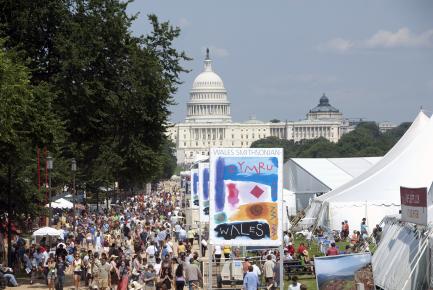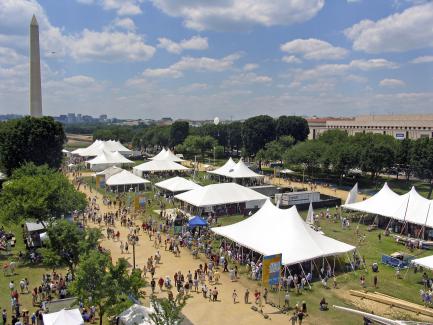Smithsonian Presents 47th Annual Folklife Festival
Visitors to the 47th annual Smithsonian Folklife Festival can learn about the country of Hungary, endangered languages and the history of aesthetics of African Americans. The Festival will be held Wednesday, June 26, through Sunday, June 30, and Wednesday, July 3, through Sunday, July 7, outdoors on the National Mall between Seventh and 14th streets. Admission is free. Festival hours are from 11 a.m. to 5:30 p.m. each day, with such special evening events as concerts and dance parties beginning at 6 p.m. The Festival is co-sponsored by the National Park Service.
Hungarian Heritage: Roots to Revival
“Hungarian Heritage: Roots to Revival” will feature more than 100 participants from this 1,000-year-old country. Artists, dancers, craftspeople and cooks will share and celebrate the customs and traditions from every part of the country.
Visitors can meet highly skilled craftspeople from the country’s rural regions and urban communities and learn traditions that are being integrated into the daily lives of villagers and city dwellers. The program will feature activities and performances related to the dance-hall (or táncház) movement, a village dance tradition that was revitalized and brought into contemporary urban settings throughout the Hungarian diaspora.
Other artisans will demonstrate traditional crafts such as candle dipping, blue dying, saddle making, mutton cooking and bridal wreath making. The program also will feature cooking demonstrations, embroidering, hat making, furniture painting, wickerwork and oven building.
One World, Many Voices: Endangered Languages and Cultural Heritage
The United Nation’s Educational, Scientific and Cultural Organization estimates that of the more than 7,000 languages in the world, nearly half of them are in danger of becoming extinct by the end of this century. “One World, Many Voices: Endangered Languages and Cultural Heritage” will focus attention on this urgent issue of global language loss by bringing together communities from around the world that are fighting to save their native tongues and cultural traditions.
Festival visitors will get the chance to hear and learn from participants representing 15 cultures working to preserve their languages. Musicians, storytellers, singers, dancers, poets, culinary experts and craftspeople will share how language embodies cultural knowledge, identity, values, technologies and arts. The program will include performances, craft demonstrations, interactive discussion sessions, community celebrations and hands-on family activities. Some of the groups featured are Native Hawaiians, Maine’s Passamaquoddy tribe, Oregon’s Confederated Tribes of Siletz Indians, the Koro people of India and several indigenous groups from Colombia.
The Will to Adorn: African American Diversity, Style, and Identity
“The Will to Adorn: African American Diversity, Style, and Identity” showcases the Folklife Festival’s five-year community research project on African American identity. This multicity collaboration examines the history and culture of the aesthetics of African Americans.
The program focuses on urban style centers like Atlanta, Washington, D.C., Baltimore, Chicago, Detroit, New Orleans, New York, Oakland, Calif., and the U.S. Virgin Islands. Students and faculty at historically African American colleges and universities have worked with Smithsonian staff to document the wearable art traditions of African Americans in their communities through interviews, photographs and fieldwork.
Featuring 40 participants, the program will show visitors the different aspects of the project, including the tools and resources used for research and the artisans they learned from. Visitors can also record their own stories about fashion and learn about the relationship between beauty and heritage within the African American community. Artisans will demonstrate their techniques in barbering, hair styling, headwear, fashion, body art, footwear, jewelry and textile design and each evening visitors can “rock the runway” and become models in their own fashion show.
Marketplace
Merchandise produced by Festival artisans and a selection of related books and Smithsonian Folkways recordings will be available for purchase at the Festival Marketplace, located in front of the Smithsonian’s National Museum of American History. Meals, snacks and beverages representing the three programs will be sold at three concession stands and two food trucks.
Accessibility
Large-print versions of the daily schedule and food concession menus, and a CD version of the program book will be available at information kiosks and the Volunteer tent. Volunteers will be on call to assist wheelchair users. All music-stage locations are equipped with audio loops. Service animals are welcome. American Sign Language interpreters will be on site to interpret selected performances and presentations. An additional interpreter is on site each day for visitors with requests beyond the scheduled events. Real-time captioning (CART) will be provided for selected performances and presentations.
To request other access services not listed above, such as real-time captioning, please call (202) 633-2921 (voice) or email access@si.edu.
About the Festival
The Smithsonian Folklife Festival, inaugurated in 1967, celebrates traditional culture with people from across the United States and around the world. The Festival includes daily programs of music, song and dance, crafts, occupational skills and cooking demonstrations, storytelling, workshops and narrative sessions for discussing cultural issues. It attracts approximately 1 million visitors a year. The Festival is a research-based production of the Smithsonian Center for Folklife and Cultural Heritage.
Follow the Festival on Facebook and Twitter. Festival fans also can keep up with each day’s events though through blogs and webcasts.
# # #
SI-206-2013
Amy Kehs
202-309-5543






